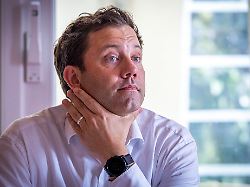Traffic light dispute with Markus Lanz
“Stunned” Klingbeil believes in three agreements
By Marko Schlichting
08/23/2023, 03:35 am
The summer break is over and the traffic light coalition is arguing again. Can the Growth Opportunities Act still be passed next week? SPD boss Klingbeil is confident about Markus Lanz. This also applies to basic child security. And for the industrial electricity price.
In the coming week, the traffic light coalition will meet for a closed conference in Meseberg, Brandenburg. After that, the coalition partners shouldn’t love each other again, but the never-ending argument must come to an end, demands SPD party leader Lars Klingbeil in the evening on ZDF at Markus Lanz.
He leaves it open whether Klingbeil himself believes in a coalition peace, but actually there is no need to say so, because the fact is: the desire for peace that Chancellor Olaf Scholz expressed during his summer press conference was not fulfilled.
Klingbeil wasn’t really happy about that either. “I already had this naïve belief that everyone looked into themselves during the summer break and summed up what had happened in the past few weeks,” said the SPD leader. “That’s not a style that makes governing fun. I thought it would be quieter. I was stunned at the moment. That was an insight into my inner life.”
“There is money for both”
The most recent dispute revolves around the Growth Opportunities Act, which the two Deputy Chancellors Robert Habeck and Christian Lindner had actually already agreed on. But then came the blockade by Family Minister Lisa Paus. But SPD man Klingbeil is certain: “They’ll get it resolved in August.”
In essence, all three traffic light parties want the law, which provides tax breaks of six and a half billion euros for the economy. So why did the family minister go it alone? He still doesn’t know that to this day, says Klingbeil. Because even with the dispute between Paus and Finance Minister Lindner about the amount of basic child security, a concept should be available before the end of the parliamentary summer break, said Klingbeil. Chancellor Scholz requested that before the summer break.
Both laws should be clear after the traffic light exam. The leader of the Greens parliamentary group, Katharina Dröge, had promised that on Monday evening on ARD. The Greens want both laws, she had said. And the Social Democrats too.
Klingbeil therefore criticizes the action taken by the family minister when she provisionally vetoed the Growth Opportunities Act: “This is an important law that would have strengthened the economy, and it has now been postponed.” He will not allow the fight against child poverty to be played off against the fight for growth. “There is space for both, there is money for both,” he says at Markus Lanz.
next fight? industrial electricity price
But the next point of contention is already looming: The Greens and parts of the SPD are demanding a reduced electricity price of six cents per kilowatt hour for industry.
Klingbeil supports the project, as does Economics Minister Habeck, many prime ministers of the federal states and – no wonder – the industry itself. Large companies in particular have a crucial means of pressure: They threaten to emigrate to Asia or the USA. There you can get a kilowatt hour of electricity for two cents.
Nevertheless, the FDP, which is otherwise considered to be business-friendly, does not agree with the industrial electricity price. Her deputy boss Johannes Vogel called for electricity price reductions for everyone on Monday on ARD. He doesn’t say where the money will come from.
“That has to be clarified now”
In Klingbeil’s opinion, there is also enough money for the industrial electricity price. It should come from a shadow budget, the Economic Stabilization Fund. It is financed from taxpayers’ money and was once intended to help companies that were floundering as a result of the Corona crisis. Initially, it contained 250 billion euros. According to Klingbeil, the lower industrial electricity price can be counter-financed with the money that the fund still contains.
However, Lindner had already expressed concerns before the summer break: According to the Finance Minister, the fund is earmarked and may only be used for Corona aid. Chancellor Scholz also spoke out against low electricity prices for energy. Klingbeil: “Olaf Scholz is against permanent subsidies, and I am too. And the industrial electricity price must be subject to conditions, such as the promotion of renewable energies.”
In fact, Scholz has since softened his general rejection a little. Last Wednesday he said at the NRW Entrepreneurs’ Day in Düsseldorf: “We cannot afford a permanent subsidy of electricity prices with the watering can and will therefore not give it either.”
“That has to be clarified now,” said Klingbeil, preparing the coalition at Lanz for intensive talks. Preferably before the budget negotiations in the Bundestag. That should take place in November. It is difficult to imagine that this time the agreement will go smoothly.
